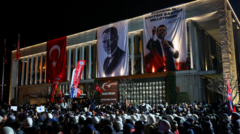Protests erupting in Turkey have drawn massive crowds for over a week, sparked by the detention of Istanbul's Mayor Ekrem Imamoglu. As authorities struggle to maintain order, the arrests of over 1,400 individuals, including political opponents, journalists, and activists, have triggered international condemnation, highlighting the political climate under President Erdogan's long-standing rule.
Thousands Protest in Turkey as Arrests Surpass 1,400 Amid Political Turmoil

Thousands Protest in Turkey as Arrests Surpass 1,400 Amid Political Turmoil
Turkey witnesses a surge in protests following the arrest of Mayor Ekrem Imamoglu, signaling widespread discontent with President Erdogan's regime.
Thousands of civilians took to the streets of Turkey for the seventh consecutive night in a wave of protests that have highlighted the growing dissent against President Recep Tayyip Erdogan’s administration. The demonstrations erupted in response to the recent arrest of Istanbul's Mayor Ekrem Imamoglu, a prominent opposition figure who has been accused of corruption—claims that critics argue are politically motivated.
The protests come amid the detainment of over 1,400 people, including students, lawyers, and media workers, as riot police employed force to manage the unrest that, they argue, threatens public safety. Rights organizations, together with the United Nations, have called for an end to the crackdown on demonstrators, labeling the government's actions as excessive and a violation of fundamental freedoms.
As the protests continued, President Erdogan made an appeal to citizens for patience and rationality, characterizing the ongoing unrest as a strategy by opponents of his government to instigate chaos in the country. Despite a police ban on demonstrations, many students gathered in Istanbul, shouting slogans calling for the resignation of the government while facing a heavy encounter with law enforcement.
The opposition party, the Republican People's Party (CHP), signaled its intentions to sustain pressure against the administration by organizing a significant rally scheduled for Saturday to support Imamoglu and advocate for more transparent legal proceedings. CHP representatives underscored the implications of Imamoglu's arrest on political discourse and pushed for demands for early elections and the protection of democratic processes.
Turkey's Interior Minister reported that as of Tuesday, 1,418 individuals had been detained amid what the government referred to as 'illegal' protests. The crackdown on dissent has also extended to the media, with journalists facing arrests while covering the protests. Prominent figures in the media landscape, such as AFP news agency, have expressed outrage regarding the arbitrary detentions, calling for better protections for journalists operating in the increasingly restrictive environment.
Imamoglu's current legal troubles do not bar him from running for president if he chooses; however, his capacity to do so hinges upon the outcome of the charges he faces. Erdogan’s long-standing political dominance remains at a critical juncture, with the president's constitutionally capped term ending in 2028—signifying that he could either seek an early election, broaden his power, or amend legal frameworks to extend his rule.
As public discontent grows, the Turkish Ministry of Justice continues to assert the independence of the judiciary while rejecting accusations linking Erdogan to the unlawful arrests and crackdown, further complicating an already charged political landscape.





















